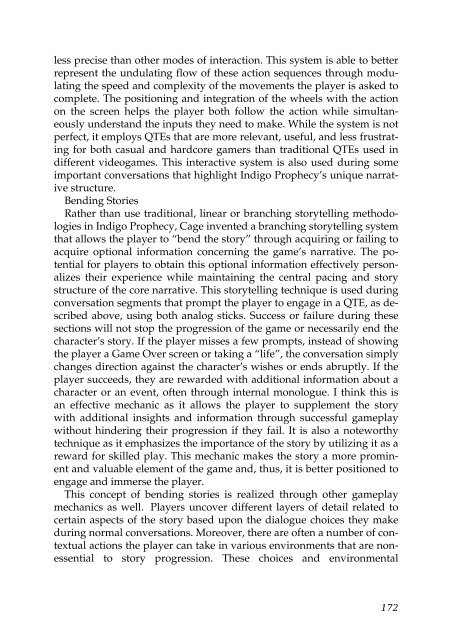Well Played 2.0: Video Games, Value and Meaning - OpenLibra
Well Played 2.0: Video Games, Value and Meaning - OpenLibra
Well Played 2.0: Video Games, Value and Meaning - OpenLibra
You also want an ePaper? Increase the reach of your titles
YUMPU automatically turns print PDFs into web optimized ePapers that Google loves.
less precise than other modes of interaction. This system is able to better<br />
represent the undulating flow of these action sequences through modulating<br />
the speed <strong>and</strong> complexity of the movements the player is asked to<br />
complete. The positioning <strong>and</strong> integration of the wheels with the action<br />
on the screen helps the player both follow the action while simultaneously<br />
underst<strong>and</strong> the inputs they need to make. While the system is not<br />
perfect, it employs QTEs that are more relevant, useful, <strong>and</strong> less frustrating<br />
for both casual <strong>and</strong> hardcore gamers than traditional QTEs used in<br />
different videogames. This interactive system is also used during some<br />
important conversations that highlight Indigo Prophecy’s unique narrative<br />
structure.<br />
Bending Stories<br />
Rather than use traditional, linear or branching storytelling methodologies<br />
in Indigo Prophecy, Cage invented a branching storytelling system<br />
that allows the player to “bend the story” through acquiring or failing to<br />
acquire optional information concerning the game’s narrative. The potential<br />
for players to obtain this optional information effectively personalizes<br />
their experience while maintaining the central pacing <strong>and</strong> story<br />
structure of the core narrative. This storytelling technique is used during<br />
conversation segments that prompt the player to engage in a QTE, as described<br />
above, using both analog sticks. Success or failure during these<br />
sections will not stop the progression of the game or necessarily end the<br />
character’s story. If the player misses a few prompts, instead of showing<br />
the player a Game Over screen or taking a “life”, the conversation simply<br />
changes direction against the character’s wishes or ends abruptly. If the<br />
player succeeds, they are rewarded with additional information about a<br />
character or an event, often through internal monologue. I think this is<br />
an effective mechanic as it allows the player to supplement the story<br />
with additional insights <strong>and</strong> information through successful gameplay<br />
without hindering their progression if they fail. It is also a noteworthy<br />
technique as it emphasizes the importance of the story by utilizing it as a<br />
reward for skilled play. This mechanic makes the story a more prominent<br />
<strong>and</strong> valuable element of the game <strong>and</strong>, thus, it is better positioned to<br />
engage <strong>and</strong> immerse the player.<br />
This concept of bending stories is realized through other gameplay<br />
mechanics as well. Players uncover different layers of detail related to<br />
certain aspects of the story based upon the dialogue choices they make<br />
during normal conversations. Moreover, there are often a number of contextual<br />
actions the player can take in various environments that are nonessential<br />
to story progression. These choices <strong>and</strong> environmental<br />
172

















